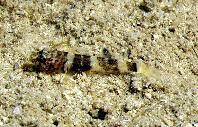| Family: |
Gobiidae (Gobies), subfamily: Gobiinae |
| Max. size: |
2.27 cm SL (male/unsexed); 2.81 cm SL (female) |
| Environment: |
demersal; marine; depth range 5 - 56 m |
| Distribution: |
Mediterranean Sea: Croatia, Spain and Italy. |
| Diagnosis: |
Diagnosis: (Juveniles without fully developed head canals), brown head; three broad brown trunk bars running transverse across the body below the first and second dorsal fin and at posterior part of caudal peduncle, with whitish interspaces; distinct dark spot at the end of first dorsal fin; ventral part of pectoral fins with black markings extending from the center of the fins to the tips (Ref. 44207). |
| Biology: |
Found in small submerged caves, sometimes associated with Corcyrogobius liechtensteini (Ref. 10711). Can occur in remarkable abundance within suitable habitats, medium and large-sized caves, with fine sediment bottom (Ref. 44207). Also found in rocky shores in deep caves in water depths from 5-56 m, usually resting directly in front of its hole and in small cavities near sea grass (Ref. 92840). |
| IUCN Red List Status: |
Least Concern (LC); Date assessed: 11 March 2014 Ref. (130435)
|
| Threat to humans: |
harmless |
Source and more info: www.fishbase.org. For personal, classroom, and other internal use only. Not for publication.
